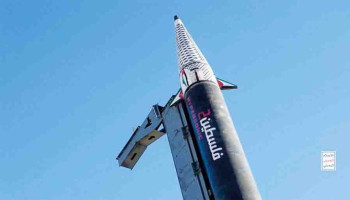According to the Hebrew outlet Calcalist, U.S. President Donald Trump was forced to halt the joint American–British air campaign on Yemen in May 2025 due to what the report described as “hidden reasons”—chief among them a single Yemeni missile launched by Sana’a forces that nearly struck the USS Harry S. Truman aircraft carrier.
The near-hit triggered panic inside the Pentagon and led to an abrupt suspension of the operation, out of fear of a potential strategic and military disaster that could severely embarrass Washington both domestically and internationally.
In an in-depth report published by the Hebrew outlet, journalist Nitzan Sadan documented what he called “the night Trump got scared,” revealing that the U.S.-U.K. “Rough Rider” campaign against northern Yemen had failed—not only due to battlefield challenges, but because the Yemeni military, as he put it, demonstrated missile deterrence capabilities that forced the U.S. Navy to completely recalculate its approach.
The report stated that Trump ended the bombing campaign on May 5, officially citing a Houthi request for de-escalation. In reality, the Pentagon had warned that a direct strike—especially on the USS Harry S. Truman—could trigger a strategic disaster and force the U.S. into an unwanted ground war in northern Yemen.
It revealed that on April 28, Yemeni forces launched a precision ballistic missile toward the Truman, based on accurate intelligence, as part of a coordinated missile and drone assault that overwhelmed U.S. defenses.
The report noted that although Yemen halted attacks on U.S. ships since May, it continues targeting vessels linked to Israel. It described the Houthis as clever fighters who surprised the world and successfully threatened key maritime routes. The report concluded that the “Rough Rider” campaign ended not by agreement but due to a single Yemeni missile strike that challenged U.S. naval power and established Yemen as a key regional player.







